How AI may soon help weed-out bad actors
The Florida Legislature in its upcoming January regular session is also going to take another look at condominium governance and regulation. The Senate Regulated Industries Committee last week got an earful from a panel that said Florida’s 1.5 million condo unit owners are too much at the mercy of their associations’ management and board of directors and that state regulation in key areas is “toothless.”
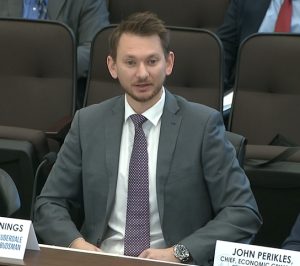
Spencer Hennings. Courtesy, The Florida Channel
Spencer Hennings, a former state condominium ombudsman, said bad actors on boards are able to evade punishment or removal due to loopholes in state law and regulation by the Department of Business and Professional Regulation (DBPR). Part of the solution he said: allow residents to petition the ombudsman and demand their boards allow electronic voting to improve unit owner participation and transparency in governance. Hennings also urged improving DBPR’s jurisdiction, “which is quite limited…to investigating record requests, election issues, and certain very limited financial issues. I think it’s quite confusing to have a 120-page condominium act filled with laws that there is no enforcement for.”
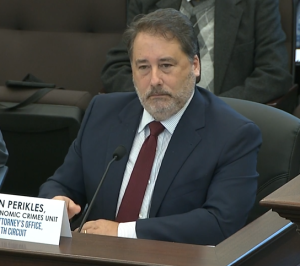
John Perikles. Courtesy, The Florida Channel
That sentiment was echoed by John Perikles, Chief of the Economic Crimes Unit at the State Attorney’s Office in Miami-Dade County. He told lawmakers it took his unit five years to bring to justice four ex-HOA members of The Hammocks, a 6,500 unit community who were arrested last year for alleged embezzlement of $2.4 million in homeowners monthly dues. He said they were able to ignore subpoenas and evade meaningful investigation because “there were no specific crimes outlined in the Florida condo or HOA statutes until very recently.” Although the legislature last spring passed the “Homeowners’ Association Bill of Right” (HB 919) some say its provisions don’t go far enough. State Senator Jennifer Bradley (R-Fleming Island) listened to the panel’s testimony and said she’s been working on a bill that she’ll file soon to address these concerns.
The problems aren’t just with condos though – they extend to homeowners associations governing single-family home communities, too. Together these communities are home to nearly half of Florida’s 22.3 million residents. “If you’re a corrupt board member of a condo or HOA, there’s still plenty of profitable business for you to do and there’s little chance of being caught,” said Perikles. (You can watch Hennings’ and Perikles’ alarming testimony here beginning at the 22:00 mark.)
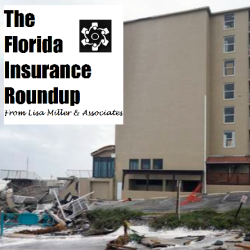 Another solution – this one from the private sector and of particular interest to insurance companies – is artificial intelligence (AI). We learned on our recent episode of The Florida Insurance Roundup podcast that advances in AI and machine learning will allow the expedient review of meeting minutes and other public documents from homeowners and condominium associations. This is going to provide insurance companies with a new underwriting tool to combat fraud.
Another solution – this one from the private sector and of particular interest to insurance companies – is artificial intelligence (AI). We learned on our recent episode of The Florida Insurance Roundup podcast that advances in AI and machine learning will allow the expedient review of meeting minutes and other public documents from homeowners and condominium associations. This is going to provide insurance companies with a new underwriting tool to combat fraud.
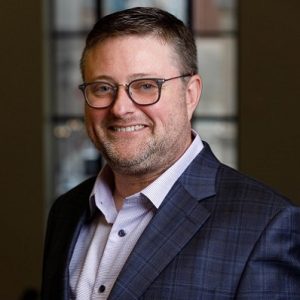
Andy McGuire, Chief Strategy Officer and Co-Founder, PEAK6 InsurTech
Andy McGuire, Chief Strategy Officer and Co-Founder of PEAK6 InsurTech was one of my guests and explained just how this can work. “With enough observations, you can run a model, for example, on the language used in the meeting minutes to potentially pick up on schemes…and we can build an AI and teach it with these talk paths or words and knowing that it resulted in fraud, you have your first learning,” said McGuire. You can get enough positive observations that you now have a model that an underwriter can load the minutes into and get a prediction (of risk). Combine that with financial data and a propensity to commit fraud of each individual member of the board, and you have a fully automated decision tree.”
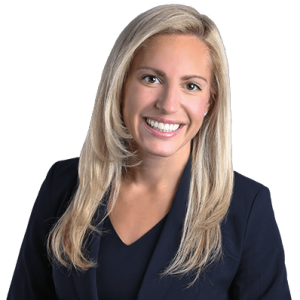
Tiffany Rothenberg, Partner, Kelly Kronenberg
My other guest was Tiffany Rothenberg, a Partner at the Kelley Kronenberg law firm’s West Palm Beach office. She represents commercial property insurance companies in complex coverage disputes, including condo and HOA claims. She described the misrepresentation she sees frequently in cases she handles and described one case where the association was seeking a $4 million windfall from the carrier.
“Oh my gosh, if we had some of the technology that Andy is talking about in the claims investigation process and also worked into the underwriting part of the insurance model, we would have a lot more tools at our disposal and be able to resolve some of these issues much quicker,” said Rothenberg. She said she also sees many cases where the homeowners or condo association doesn’t have money in their building reserve account because they’ve been waiving their reserve funding requirement over multiple years. McGuire explained how AI can help with that, too.
You can read more about our conversation and listen to the episode titled “Insurers: Know the Building AND The Board” here.
LMA Newsletter of 11-20-23

